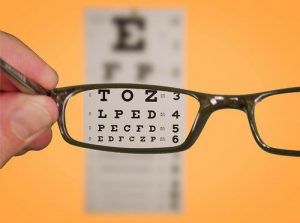Revised Common Lectionary for the Sixth Sunday of Easter, Year A
May 21, 2017
Lessons: Acts 17:22-31, Psalm 66:8-20, 1 Peter 3:13-22, John 14:15-21
Theme: God’s faithful and generous people rely on prayer, scripture, sacraments, and the work of the Holy Spirit to help us see clearly God’s will for us, our congregations, and indeed all of creation.
Key Scripture: In a little while the world will no longer see me, but you will see me; because I live, you also will live. John 14:19
Preaching/Teaching Reflection

Photo by Ken Teegardin for www.seniorliving.org, used by Creative Commons license.
A few years ago my youngest daughter saw a new optometrist for her annual eye exam. She had complained on and off for several years about various vision problems affecting her ability to see both up close and at a distance. It has been quite a struggle to fit her with suitable lenses. This particular practitioner recommended a slightly different approach to her prescription, one that resulted in correction for both problems. Yes, her new lenses were considerably more costly, but she can see clearly without eye strain. She can now see both the board at the front of the classroom and her text or computer screen. All things now come clearly into focus when she’s wearing her new glasses.
It isn’t that different with our “spiritual vision.” Spiritual blindness is far too common a malady for humankind. When we can’t see clearly, we tend to look around for quick fixes instead of turning to the one who can restore our vision, allowing us to see clearly. We look for “vision correction” in all the wrong places, seeking fulfillment through new possessions, excessive collections, bigger houses, and more and more stuff. We eat and drink our way to ill health, we feed our addictions and need with temporary and transient fixes, and we amuse ourselves to excess to wile away the empty hours. Try as we might, our attempts at vision correction often end up only making the situation worse. Countless hours and wasted resources bear witness to our efforts.
The good news is that our great physician is ready and able to adjust our sight and fit us with corrective, discipleship lenses through which we may see the world aright. In this Sunday’s gospel lesson Jesus reassures his disciples that even though he must leave them for a while, they will not be abandoned or left alone. The same promise applies to us today.
The Spirit, the Advocate, is with us forever. No, we have not seen Jesus in the flesh, but we do see Jesus through the corrective lens  of discipleship. We see Jesus in the breaking of bread and drinking of wine in Holy Communion. We see Jesus in the face of our neighbor, in the faces of those on the margins–the poor and outcast. We understand Jesus to be among us wherever two or more gather in his name (Matthew 18:20).
of discipleship. We see Jesus in the breaking of bread and drinking of wine in Holy Communion. We see Jesus in the face of our neighbor, in the faces of those on the margins–the poor and outcast. We understand Jesus to be among us wherever two or more gather in his name (Matthew 18:20).
Yes, as Christians who wear a Christ-centered, cross-shaped identity we are able to see the world clearly. We no longer need to worry or fret about fear-mongering and end-time prophecies, about whether the world is marching merrily to hell in a handbasket. We have our instructions. Jesus tells all disciples “If you love me, you will keep my commandments” (John 14:15). We are called to love and serve in the name of Christ. It’s just that simple.
The tough part is keeping our focus in a world that tries at every breath to draw us away and fragment our vision. Be it as individuals, as congregations, or even as denominational bodies, the key lies in keeping our eyes on Jesus and our actions in line with his commands. When we seek to serve our Lord by the power of the Holy Spirit our chances of clear vision are pretty good.
Don’t be discouraged. Don’t allow yourself to be distracted. Keep your eyes on the One who loves you and who will never leave you. There you will find life and clear sight. Thanks be to God!
In Worship
Consider singing “Be Thou my Vision,” “Open the eyes of my Heart,” or “Praise the One who Breaks the Darkness.” If your congregation has a vision statement, can your congregants recall it without help? What makes our vision fuzzy? What prevents us from seeing with 20/20 discipleship vision? What do we see clearly?
Before the intercessory prayers, invite congregants to write a simple petition for one thing they need for God to help them see more clearly. Collect all of the petitions. Consider making a word cloud to publish or find some other way to share the petitions. If your congregation uses social media, consider using creating a hashtag and invite congregants to respond.
With Youth
Context is everything. If you want to convince others to see your vision, you have to make it accessible to them. It is easy NOT to talk about your faith in a world that is indifferent or even hostile to Christianity. It is easy NOT to talk about your faith when people think all Christians are judgmental, hypocritical, and narrow-minded because of the actions of a few that seem to get a lot of media coverage. This is nothing new.
Invite your youth into the story from Acts 17 where Paul is using the Athenian religious culture and their altar “To an unknown god” to share the story of the God of the Cosmos. By meeting the Athenians where they were, he was able to move them to hear and understand his story. Choose some other examples throughout history. Martin Luther used the printing press to make scripture available to the German rulers and common people, giving them both understanding and power. We can do the same today. What aspects of our current culture are ripe for evangelism within a specific context? One example you might use is The Work of the People, a powerful film resource and ministry.
With Children
Gather a collection of old prescription lenses and reading glasses. Invite the children to try them on. Ask them about their vision. What do they see? Is their sight better or worse with the corrective lenses? Use this exercise as a springboard to talk about how Jesus gives us clear vision to see him. When we see clearly in Christ, we are better able to see and meet the needs of the world. Challenge each child to pray for clear vision to see the needs of their family, their congregation, and the world.
Weekly Stewardship Bulletin Insert
This week’s lesson from John’s gospel gives us Jesus’ words to his disciples as he tries to prepare them for his departure. We know they couldn’t see and understand clearly until they looked back. We, too, sometimes have trouble seeing God’s divine will and desire for our lives. Part of being a good steward is to focus on Jesus’ commandments and strive to follow his way. Of course, we are incapable of doing this on our own. We need to listen for and look for God’s Spirit in our lives. Relying fully on the Triune God is indeed good stewardship!
Stewardship at Home
Our gospel lesson this week begins “If you love me, you will keep my commandments” (John 14:15). Most of us would quickly respond, “Well, of course we love you, Lord!”
But it isn’t that simple, is it? Jesus’ commands, love God with all we’ve got and love our neighbors as ourselves, may sound easy, but in practice it’s a challenge. In fact, there’s no way we can do it on our own. We need the gift of the Holy Spirit that we were given in baptism. We need to immerse ourselves in scripture and pray daily. We need to worship regularly, cultivate relationships that provide support and mutual accountability, serve both within our congregations and in the world, and cultivate generosity.
Our clear vision is shaped by our discipleship, by the “lens” through which we view the world and live, by opening our lives to the work of the Holy Spirit. This week offer prayer every day for God to open your eyes, focus your sight on Jesus, and give you clear vision to see and respond in faith.
Photos: Kamaljith K V, Ken Teegardin, and Robert Blezard, Creative Commons. Thanks!
Note: Reprint rights granted to congregations and other church organizations for local, nonprofit use. Just include this note: “Copyright (c) 2017, Rev. Sharron Blezard. Used by Permission.” Other uses, please inquire: thewritelife@hotmail.com.




Leave a Reply